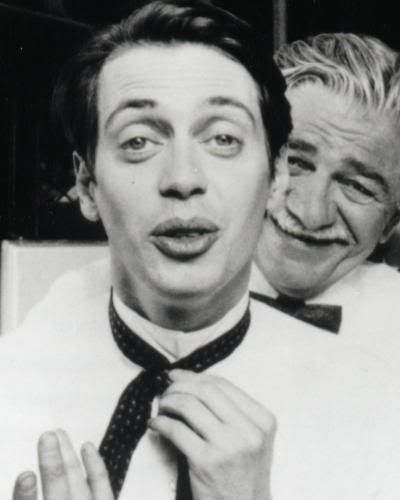 Broken Flowers (Dir: Jim Jarmusch, 2005)
Broken Flowers (Dir: Jim Jarmusch, 2005)Bill Murray and Jim Jarmusch have been offering pretty similar schtick in recent years, so there's a sense of inevitability that these behemoths of slightly-maladjusted masculinity should bump heads at some stage. And to say the result is a bit disappointing is, perversely, rather what you'd expect and desire.
The plot, as it is, is simple. Murray's Don Johnston ("with a 'T'") is a materially successful, emotionally vacant man with a big television and a fine collection of Fred Perry leisurewear. His girlfriend (Julie Delpy) leaves him just as he receives a letter purporting to be from an unidentified ex-girlfriend, informing him that he has a 19-year-old son. His neighbour Winston (Jeffrey Wright) persuades him to track down his former lovers. So he does.
It doesn't warrant a SPOILER ALERT if I inform you that Don's quest is unsuccessful. More importantly (and more Jarmuschian), he doesn't "learn something about himself" either. He just drives and flies around, reacquainting himself with his exes, with varying levels of embarrassment and violence. And then he comes home, to his empty house and his big telly. There are a couple of encounters, one awkward, one utterly fleeting, with young men who might be... maybe... but almost certainly aren't.
This is chamber Jarmusch, a small film. Don never faces danger, beyond a punch from a possessive redneck, and a supercilious look from Chloe Sevigny. There's no equivalent of the wilderness that envelops Johnny Depp in Dead Man, or the urban corruption that Forest Whittaker faces in Ghost Dog. If Don has any cinematic antecedents, it's the suburban schnooks that Jack Lemmon used to play, or maybe Kevin Spacey's Lester Burnham.
Bill Murray, of course, does his Bill Murray thing, with that Bill Murray face that he uses whether he's falling for Scarlett Johansson or zapping ghosts. He offers no surprises to anyone who's been inside a cinema in the last 20 years, but in his own, tired way, he communicates as much as a closing line from Beckett. Although Krapp never boasted such a spiffy line in Fred Perry tracksuits.
 While we're in Jarmuschland, this week I finally got round to watching In The Soup (Dir: Alexandre Rockwell, 1992), in which J.J. makes a brief appearance. The movie's most lasting claim to historical notoriety is that it won the Grand Jury Prize at Sundance in '92, edging out a little gangster flick called Reservoir Dogs.
While we're in Jarmuschland, this week I finally got round to watching In The Soup (Dir: Alexandre Rockwell, 1992), in which J.J. makes a brief appearance. The movie's most lasting claim to historical notoriety is that it won the Grand Jury Prize at Sundance in '92, edging out a little gangster flick called Reservoir Dogs.Ominously, it's the tale of a frustrated NYC moviemaker called Adolpho Rollo, played by Steve Buscemi. Already the alarm bells are going; you can hear the film-school tutor saying "Write about what you know..." Rockwell and his alter ego even share the same initials. Help.
Actually, it's not that bad. Adolpho gets caught up in the schemes of the overbearing Joe (the magnificent Seymour Cassel), who's prepared to finance his hysterically-atrocious-sounding flick with the proceeds of numerous dodgy deals. The problem is, Adolpho is expected to help out in the scams, which culminate in a drug deal involving a dwarf and a man in a gorilla suit.
So far, so indie-schmindie. Now, retrospect is a fine thing, but it's hard to see what got the jury so excited over this, rather than Q.T.'s little outing. It's all just so student-filmy, with sequences thrown in clinically to appeal to cinephiles and ironic chin-strokers; most egregious being the pillow fight, a la Zero de Conduite. And when, at the end, Adolpho suggests to Joe, "Let's make a film about us!" it feels like the jump-the-shark moment in a tired sitcom, when the writers suddenly decide to get all self-referential. Metafiction for Dummies, anyone? And surely we've all realised how lazy the "dwarf=weirdness" trope has become after Peter Dinklage's rant in the rather better Steve-Buscemi-tries-to-make-a-movie movie Living In Oblivion.
On the plus side, the acting is mostly good (although Jennifer Beals as the object of Adolpho's frustrated yearning has a touch of "I'm the director's wife, btw" about her). But the whole enterprise is summed up by the fact that the movie was shot in colour, then converted to mono. Which, presumably, was enough to satisfy the great and the good at Sundance of its indie credentials, but didn't hack it in the wider world.
2 comments:
Wow, you beat me to it.
Beat you to what? Please elucidate...
Post a Comment